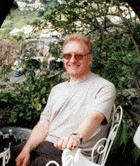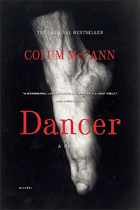 Tony Heyes, our man from England,
Tony Heyes, our man from England, reviews Colum McCann's
 Dancer
Dancer by Colum McCann
Publisher: Picador USA
ISBN: 0312423187
Paperback, 352pp
February 2004
[Published by Phoenix 2003
ISBN 0753817047]
As I a teenager I temporarily bankrupted myself by buying a ticket to see Margot Fonteyn dance. She was appearing at Manchester Opera House as Odette/Odile in Swan Lake, opposite David Wall’s Prince Siegfried. He was a very young dancer making his debut. Just before the curtain was about to go up a voice came over the theatre’s sound system: “Ladies and gentlemen, we regret that, owing to injury, Mr. David Wall is unable to dance this evening”. A low groan came from the audience. The voice continued: “However, Mr. Rudolf Nureyev has agreed to substitute for him and has flown in from Paris this afternoon”. This was more than a consolation prize: it was the jackpot! Nureyev had only just begun his meteoric passage across the western balletic firmament and we were all agog to see him. He went on to become the world’s first ballet superstar, changing the world of ballet. Bringing classical dance to the attention of everyone and making it more popular than ever, he raised the profile of the male dancer inestimably. Thanks to him, the male soloist now enjoys parity of esteem with the prima ballerina, no longer being there solely to hold her up.
That night he padded onto the stage like a panther, exuding animal magnetism from every pore and mesmerising the entire audience. Fonteyn, as she always did when she danced with him, rose to the occasion and danced (almost) like a woman half her age, making up with a lifetime’s artistry for what she had lost in youthful athleticism. Even so, she managed the famous 32 fouettés in Act III, one of the biggest challenges in the classical repertoire (I counted them) and brought the house down. It was an evening I’ve never forgotten and although I saw Nureyev live again years later in Don Quixote, this was the one performance above all others that remains burned on my brain. I can now bore people to extinction as I describe how once I saw Nureyev in all his pomp.
When he died one newspaper headline ran, “THE LORD OF THE DANCE IS DEAD.” Everyone knew who was meant. Any other dancer would have had to be named. I remarked to a friend that he had left nothing behind. How wrong can you be!? I’d forgotten that “we’ll always have Paris”. Nureyev became artistic director of the Paris Opéra Ballet in 1983 at the height of his creative powers. It is there that his true legacy can be found. He left behind thirteen definitive ballets, the summation of his art which, literally and figuratively keep the dancers on their toes, and trained up a generation of dancers who have spent their careers as keepers of the flame. Elisabeth Platel has recently become Directrice of the Ballet School at Nanterre whilst Laurent Hilaire has just been appointed Maître de Ballet. Meanwhile, the sublime Manuel Legris, who was “named” (made an étoile) in New York by Nureyev, continues to dance with a perfection Nureyev himself never attained. Now, when I make my annual pilgrimage to Paris for an infusion of culture, visiting the Opéra Bastille and the Opéra Garnier, it is to see at least one Nureyev Ballet. I always think I’ve died and gone to Heaven and come away from a performance on cloud nine, entranced by the beauty and the music.
Where did all this spiritual richness come from? How did this little man from nowhere manage to achieve so much? Several biographies of him have been written, with an official one commissioned by the Nureyev Foundation due out next year. However, even the best of them, Diane Solway’s, has serious lacunae. In the meantime we have Colum McCann’s remarkable novel Dancer.
Mr. McCann’s book is a curious hybrid, what Norman Mailer would call “faction”. Taking some known facts from Nureyev’s life and historical characters, he mixes in fictitious people and invented incidents to try to capture the essence of Nureyev, an extremely difficult undertaking. Nureyev was a secretive person always on the run from the KGB and, possibly, from his own demons. Dancer opens with a description of the harrowing conditions endured by Russian soldiers during the “Great Patriotic War”. Whilst Nureyev’s father was away fighting in this war, his son was being reared in conditions of poverty unimaginable in modern western society. When Nureyev senior returned his son was already formed and his course set. He would dance. No matter what his uncomprehending father or anyone else said, he would dance. And dance he did; first in Ufa, his home city and then, miraculously with the Kirov Ballet in Leningrad, to which school he was admitted at the advanced age of seventeen, sleeping among children of twelve and thirteen. The Kirov Ballet has a School of Perfection and perfection was what Nureyev always strove for. Like all artists he was never satisfied with his own work. Although he was really too old to be undertaking such training he worked relentlessly. He had an infinite capacity for learning and spent his entire life acquiring knowledge of everything. His other appetites were equally as voracious. Realising he would never fulfil his potential in Russia and constrained by Soviet Puritanism, which frowned on his homosexuality, he made his famous bid for freedom in Paris where he was to die. For many years afterwards he led the life of a nomad, always in fear of Soviet agents after having been tried in absentia for treason and been sentenced to seven years hard labour. It is a strange society that constrains its citizens to such an extent.
Mr. McCann’s approach is to examine various aspects of Nureyev’s life from a variety of viewpoints – the omniscient authorial one, the narrower ones of relations, friends, colleagues and employees and, occasionally, that of Nureyev himself. Necessarily it is a partial account but this prismatic approach does enable him to convey much of the flavour of Nureyev’s life and explain some of his idiosyncrasies. His fierce loyalty and generosity to friends and cynicism towards users, his explosive temper, his passion, his relentless dancing beyond all reason and his restlessness all become comprehensible when seen in context.
Mr. McCann has his own idiosyncrasies – a reluctance to use quotation marks and an occasionally peculiar attitude to paragraphing - but, despite these pedantic reservations, his book is gripping and moving and a tour de force of biographical reconstruction, psychologically if not factually truthful. As a glimpse of a great, complex and haunted artist it is brilliant.